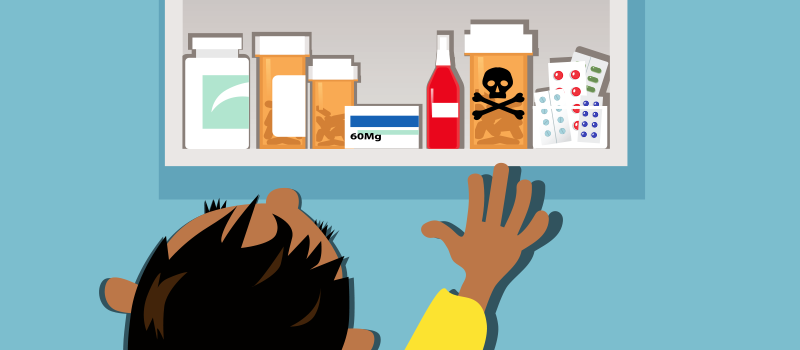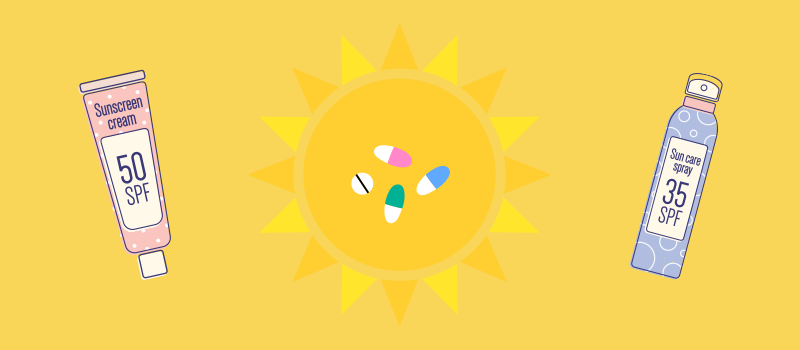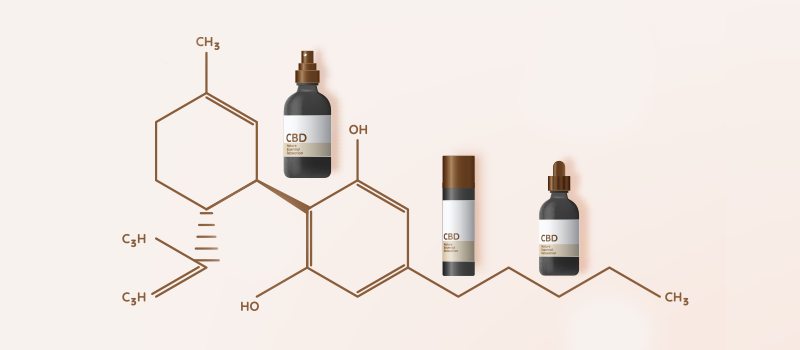What’s the Buzz
The Bee Healthy Blog
4 Medications That Can Cause Burning Mouth Syndrome

Key Takeaways
-
Blood pressure medications such as captopril and enalapril, an HIV (human immunodeficiency virus) medication called efavirenz (Sustiva), antidepressants such as fluoxetine and sertraline, and hormone replacement therapy can cause burning mouth syndrome.
-
The exact cause of burning mouth syndrome is unclear, but other than a side effect of medication, it is believed to be due to nerve damage and alterations in taste sensation.
-
Topical or systemic clonazepam, antidepressants, anti-seizure medications, and medications used to treat nerve pain, such as gabapentin, can decrease pain and improve symptoms of burning mouth syndrome.
Burning mouth syndrome (BMS), also called burning tongue, scalded mouth syndrome, or glossodynia, refers to a burning sensation in the lips, tongue, palate, and other parts of the mouth.
The exact cause of the oral burning and sore mouth is unclear, but it is believed to be due to nerve damage and alterations in taste sensation. Burning mouth syndrome can also be a side effect of certain medications. Please continue reading to find out more.
What is burning mouth syndrome (BMS)?
This is a condition in which your mouth feels like it is scalded, similar to what you experience after sipping on very hot drinks like tea or coffee.
There is a pain and burning feeling that usually affects the lips, tongue, and roof of the mouth. However, the oral mucosa (inner lining of the mouth) looks normal, and there is no obvious cause for the chronic oral burning or inflammation.
The symptoms of burning mouth syndrome can start suddenly. BMS can cause continuous symptoms with constant pain. BMS symptoms can sometimes last for months or even years. They can also be intermittent symptoms that come and go with symptom-free days in between. The burning sensation tends to get better overnight and increases throughout the day. People with BMS might feel fine when they wake up, but the BMS pain may resume as the day goes on.
Other symptoms accompanying the burning feeling can include numbness, altered taste (such as a bitter or metallic taste), and dry mouth.
In some people, burning mouth symptoms can be severe enough to affect mental health. People with BMS often have anxiety and depression as a result of their chronic pain.
What are the types of burning mouth syndrome?
Burning mouth syndrome is of two types:
Primary burning mouth syndrome
This is also called idiopathic burning mouth syndrome. There is no known cause for the burning mouth symptoms.
Secondary burning mouth syndrome
The burning mouth syndrome symptoms are due to an underlying condition, for example, an oral fungal infection or acid reflux. Fortunately, treating the primary condition usually resolves the secondary BMS pain.
What does a burning tongue signify?
The exact cause of a burning tongue can be difficult to identify, but experts say it occurs due to nerve damage in parts of the tongue associated with pain and bitter taste perception. It’s been found that many people with BMS have decreased sensitivity to bitter taste sensations in the anterior two-thirds (front and tip) of the tongue.
Researchers think the loss of bitter taste buds leads to an excessive firing of pain fibers in the area.
What are the risk factors for BMS?
Postmenopausal women above 60 years of age are at a higher risk of developing burning mouth syndrome. Falling estrogen levels are believed to decrease the sensitivity of taste buds in these individuals.
Also, females are more often supertasters, i.e., they have a genetic ability to taste more intensely than males. This can be a risk factor for burning mouth syndrome.
BMS often occurs with another tongue condition known as geographic tongue, in which there are patchy red areas on the tongue.
What autoimmune diseases cause a burning mouth?
Autoimmune diseases that can cause a burning mouth include Sjogren’s syndrome and oral lichen planus.
Other medical conditions that have been linked to burning mouth syndrome include both oral and non-oral pathology, such as acid reflux, dry mouth, oral mucosal diseases, mouth infections, oral thrush (yeast infection in the mouth), allergies to metallic dental materials, irritating dentures, allergic reactions to certain foods, jaw clenching, teeth grinding, hormonal imbalances, nutritional deficiencies, chronic anxiety and depression, diabetes, liver disease, and thyroid disease.
Burning mouth syndrome has also been linked to chemotherapy and radiation therapy in cancer patients.
Rarely, burning mouth syndrome symptoms can be a sign of oral cancer.
What medications can cause burning mouth syndrome?
Medications that can cause burning mouth syndrome include:
-
Antidepressants such as fluoxetine and sertraline.
-
Hormone replacement therapy.
What can be mistaken for burning mouth syndrome?
Other causes of chronic orofacial pain besides burning mouth syndrome include trigeminal neuralgia, postherpetic neuralgia, glossopharyngeal neuralgia, atypical odontalgia, and other neuropathic disorders. Your doctor will also consider temporomandibular disorders (TMD) and headache disorders before making a diagnosis of burning mouth syndrome.
How is burning mouth syndrome diagnosed?
Doctors and dentists rely on medical history, symptoms, blood tests, allergy testing, imaging tests, salivary flow tests, oral swab tests, and tissue biopsies for diagnosing burning mouth syndrome.
What is the best burning mouth syndrome treatment?
Topical or systemic clonazepam (solution for topical application or oral medicine) helps to decrease pain and improve symptoms of burning mouth syndrome. It is especially effective in people who have taste alterations along with the burning pain.
Small studies with matched control subjects have shown that dietary supplements such as alpha lipoic acid (ALA) and topical capsaicin rinse can also help in improving the oral burning associated with burning mouth syndrome. However, there can be intense burning for up to 20 minutes after use of topical capsaicin.
Other medications that may help with burning mouth syndrome treatment include antidepressants, anti-seizure medications, and medications used to treat nerve pain, such as gabapentin.
A meta-analysis evaluated 23 randomized-controlled trials on the different treatments for burning mouth syndrome. In addition to the treatment option mentioned above, there are mentions of other treatment approaches, such as:
-
Cholinergic drugs such as bethanechol
-
Electromagnetic radiation with low-level laser therapy
-
Physical barriers such as tongue protectors
-
Cognitive therapy
-
Other dietary supplements, such as St. John’s Worts
-
Other topical treatments, including lactoperoxidase oral rinse (Biotene) and topical urea
Notably, the authors of this meta-analysis mentioned that while this review has found some evidence for short-term benefits of some of the BMS treatments, some evidence is insufficient or contradictory. Additionally, the evidence quality for both short-term and long-term outcomes is very low.
While there is currently no best treatment for BMS, this meta-analysis provides valuable data and results to help healthcare providers manage patients with BMS symptoms.
What vitamins help burning mouth syndrome?
A nutritional deficiency of folate, vitamin B12, and iron can be a potential cause of burning mouth syndrome. If you have a vitamin deficiency, taking supplements may provide relief from the burning pain.
How do you fix burning mouth syndrome at home?
Chewing gum and increasing water intake helps some people with BMS. Sucking on ice chips can have a numbing effect and provide some temporary relief from the burning feeling in your mouth.
How to prevent burning mouth symptoms?
It may be impossible to completely prevent burning mouth syndrome. But you can control the burning sensation by optimizing general health factors and reducing the use of things that can irritate the oral mucosa, such as:
-
Alcohol
-
Tobacco
-
Alcohol-containing mouthwash
-
Hot and spicy foods
-
Acidic foods
Key Takeaways
Burning mouth syndrome (BMS) is a chronic condition that can last for months or even years. It is associated with a burning pain in the mouth that can be multifactorial in origin. If an underlying cause can be identified, treating that condition may cure burning mouth syndrome. But sometimes, no specific cause can be found. In such cases, burning mouth syndrome treatment with medications like topical or systemic clonazepam may help to improve symptoms.
BMS can cause chronic pain that results in depression and anxiety. Talk to your doctor if you have burning mouth syndrome and if your mental health is affected by this condition.
Save on Your Medication with BuzzRx!
Manage your medication costs with BuzzRx coupons. Here are direct links to substantial savings for each medication:
-
Captopril Coupon: The retail price is as high as $125.06, but with BuzzRx, you might pay as low as $39.44.
-
Enalapril Maleate Coupon: Typical retail prices are around $73.50, and with BuzzRx coupons, you could pay as little as $21.88.
-
Efavirenz Coupon: Save with BuzzRx coupons, with prices as low as $234.25.
-
Fluoxetine Coupon: Typical prices are up to $45.55. With BuzzRx coupons, pay as low $13.31.
-
Sertraline Coupon: Retail prices are between $45.99 and $85.99. With BuzzRx coupons, pay between $20.76 and $7.76, depending on the pharmacy.
-
Clonazepam Coupon: Prices are as high as $25.99. With BuzzRx coupons, pay as little as $4.38.
-
Capsaicin Coupon: With BuzzRx coupons, pay as low as $67.72.
-
Gabapentin Coupon: With BuzzRx coupons, pay between $3.62 and $14.80.
-
Bethanechol Chloride Coupon: Prices are as high as $172.99. With BuzzRx coupons, pay as low as $25.60.
-
St. John's Wort Coupon: With BuzzRx, pay as low as $6.23.
-
Biotene Coupon: Use your BuzzRx coupons and pay as little as $8.55.
Remember, these coupons are widely accepted at over 60,000 pharmacies, including major chains like CVS, Walgreens, and Rite Aid. Just present your coupon at the pharmacy to ensure you're getting the best possible price.
References:












SOCIAL